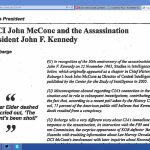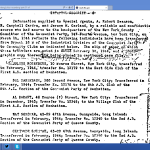Hah….say it isn’t so….C’mon…but who ordered the CIA to protect facts and sources? At least since most of us never trusted the Warren Commission Report, some new facts are revealed. Ever wonder why the entire file is not declassified, which is law after 50 years? (Ask Barack Obama).
Politico: John McCone came to the CIA as an outsider. An industrialist and an engineer by training, he replaced veteran spymaster Allen Dulles as director of central intelligence in November 1961, after John F. Kennedy had forced out Dulles following the CIA’s bungled operation to oust Fidel Castro by invading Cuba’s Bay of Pigs. McCone had one overriding mission: restore order at the besieged CIA. Kennedy hoped his management skills might prevent a future debacle, even if the Californian—mostly a stranger to the clubby, blue-blooded world of the men like Dulles who had always run the spy agency—faced a steep learning curve.
After JFK’s assassination in Dallas in November 1963, President Lyndon Johnson kept McCone in place at the CIA, and the CIA director became an important witness before the Warren Commission, the panel Johnson created to investigate Kennedy’s murder. McCone pledged full cooperation with the commission, which was led by Chief Justice Earl Warren, and testified that the CIA had no evidence to suggest that Lee Harvey Oswald, the assassin, was part of any conspiracy, foreign or domestic. In its final report, the commission came to agree with McCone’s depiction of Oswald, a former Marine and self-proclaimed Marxist, as a delusional lone wolf.
But did McCone come close to perjury all those decades ago? Did the onetime Washington outsider in fact hide agency secrets that might still rewrite the history of the assassination? Even the CIA is now willing to raise these questions. Half a century after JFK’s death, in a once-secret report written in 2013 by the CIA’s top in-house historian and quietly declassified last fall, the spy agency acknowledges what others were convinced of long ago: that McCone and other senior CIA officials were “complicit” in keeping “incendiary” information from the Warren Commission.

According to the report by CIA historian David Robarge, McCone, who died in 1991, was at the heart of a “benign cover-up” at the spy agency, intended to keep the commission focused on “what the Agency believed at the time was the ‘best truth’—that Lee Harvey Oswald, for as yet undetermined motives, had acted alone in killing John Kennedy.” The most important information that McCone withheld from the commission in its 1964 investigation, the report found, was the existence, for years, of CIA plots to assassinate Castro, some of which put the CIA in cahoots with the Mafia. Without this information, the commission never even knew to ask the question of whether Oswald had accomplices in Cuba or elsewhere who wanted Kennedy dead in retaliation for the Castro plots.
While raising no question about the essential findings of the Warren Commission, including that Oswald was the gunman in Dallas, the 2013 report is important because it comes close to an official CIA acknowledgement—half a century after the fact—of impropriety in the agency’s dealings with the commission. The coverup by McCone and others may have been “benign,” in the report’s words, but it was a cover-up nonetheless, denying information to the commission that might have prompted a more aggressive investigation of Oswald’s potential Cuba ties.
Initially stamped “SECRET/NOFORN,” meaning it was not to be shared outside the agency or with foreign governments, Robarge’s report was originally published as an article in the CIA’s classified internal magazine, Studies in Intelligence, in September 2013, to mark the 50th anniversary of the Kennedy assassination. The article, drawn from a still-classified 2005 biography of McCone written by Robarge, was declassified quietly last fall and is now available on the website of The George Washington University’s National Security Archive. In a statement to POLITICO, the CIA said it decided to declassify the report “to highlight misconceptions about the CIA’s connection to JFK’s assassination,” including the still-popular conspiracy theory that the spy agency was somehow behind the assassination. (Articles in the CIA magazine are routinely declassified without fanfare after internal review.)
Robarge’s article says that McCone, quickly convinced after the assassination that Oswald had acted alone and that there was no foreign conspiracy involving Cuba or the Soviet Union, directed the agency to provide only “passive, reactive and selective” assistance to the Warren Commission. This portrait of McCone suggests that he was much more hands-on in the CIA’s dealings with the commission—and in the agency’s post-assassination scrutiny of Oswald’s past—than had previously been known. The report quotes another senior CIA official, who heard McCone say that he intended to “handle the whole (commission) business myself, directly.”
The report offers no conclusion about McCone’s motivations, including why he would go to lengths to cover-up CIA activities that mostly predated his time at the agency. But it suggests that the Johnson White House might have directed McCone to hide the information. McCone “shared the administration’s interest in avoiding disclosures about covert actions that would circumstantially implicate [the] CIA in conspiracy theories and possibly lead to calls for a tough US response against the perpetrators of the assassination,” the article reads. “If the commission did not know to ask about covert operations about Cuba, he was not going to give them any suggestions about where to look.”
In an interview, David Slawson, who was the Warren Commission’s chief staff investigator in searching for evidence of a foreign conspiracy, said he was not surprised to learn that McCone had personally withheld so much information from the investigation in 1964, especially about the Castro plots.
“I always assumed McCone must have known, because I always believed that loyalty and discipline in the CIA made any large-scale operation without the consent of the director impossible,” says Slawson, now 84 and a retired University of Southern California law professor. He says he regrets that it had taken so long for the spy agency to acknowledge that McCone and others had seriously misled the commission. After half a century, Slawson says, “The world loses interest, because the assassination becomes just a matter of history to more and more people.”
The report identifies other tantalizing information that McCone did not reveal to the commission, including evidence that the CIA might somehow have been in communication with Oswald before 1963 and that the spy agency had secretly monitored Oswald’s mail after he attempted to defect to the Soviet Union in 1959. The CIA mail-opening program, which was later determined to have been blatantly illegal, had the code name HTLINGUAL. “It would be surprising if the DCI [director of central intelligence] were not told about the program” after the Kennedy assassination, the report reads. “If not, his subordinates deceived him. If he did know about HTLINGUAL reporting on Oswald, he was not being forthright with the commission—presumably to protect an operation that was highly compartmented and, if disclosed, sure to arouse much controversy.”
In the 1970s, when congressional investigations exposed the Castro plots, members of the Warren Commission and its staff expressed outrage that they had been denied the information in 1964. Had they known about the plots, they said, the commission would have been much more aggressive in trying to determine whether JFK’s murder was an act of retaliation by Castro or his supporters. Weeks before the assassination, Oswald traveled to Mexico City and met there with spies for the Cuban and Soviet governments—a trip that CIA and FBI officials have long acknowledged was never adequately investigated. (Even so, Warren Commission staffers remain convinced today that Oswald was the lone gunman in Dallas, a view shared by ballistics experts who have studied the evidence.)
In congressional testimony in 1978, after public disclosures about the Castro plots, McCone claimed that he could not have shared information about the plots with the Warren Commission in 1964 because he was ignorant of the plots at the time. Other CIA officials “withheld the information from me,” he said. “I have never been satisfied as to why they withheld the information.” But the 2013 report concluded that “McCone’s testimony was neither frank nor accurate,” since it was later determined with certainty that he had been informed about the CIA-Mafia plots nine months before his appearance before the Warren Commission.
Robarge suggests the CIA is responsible for some of the harsh criticism commonly leveled at the Warren Commission for large gaps in its investigation of the president’s murder, including its failure to identify Oswald’s motive in the assassination and to pursue evidence that might have tied Oswald to accomplices outside the United States. For decades, opinion polls have shown that most Americans reject the commission’s findings and believe Oswald did not act alone. Four of the seven commissioners were members of Congress, and they spent the rest of their political careers badgered by accusations that they had been part of a coverup.
“The decision of McCone and Agency leaders in 1964 not to disclose information about CIA’s anti-Castro schemes might have done more to undermine the credibility of the commission than anything else that happened while it was conducting its investigation,” the report reads. “In that sense—and in that sense alone—McCone may be regarded as a ‘co-conspirator’ in the JFK assassination ‘cover-up.’”
If there was, indeed, a CIA “cover-up,” a member of the Warren Commission was apparently in on it: Allen Dulles, McCone’s predecessor, who ran the CIA when the spy agency hatched the plots to kill Castro. “McCone does not appear to have any explicit, special understanding with Allen Dulles,” the 2013 report says. Still, McCone could “rest assured that his predecessor would keep a dutiful watch over Agency equities and work to keep the commission from pursuing provocative lines of investigation, such as lethal anti-Castro covert actions.” (Johnson appointed Dulles to the commission at the recommendation of then-Attorney General Robert Kennedy.)
The 2013 report also draws attention to the contacts between McCone and Robert Kennedy in the days after the assassination. In the wake of the Bay of Pigs disaster in 1961, the attorney general was asked by his brother, the president, to direct the administration’s secret war against Castro, and Robert Kennedy’s friends and family acknowledged years later that he never stopped fearing that Castro was behind his brother’s death. “McCone had frequent contact with Robert Kennedy during the painful days after the assassination,” the report says. “Their communication appears to have been verbal, informal and, evidently in McCone’s estimation, highly personal; no memoranda or transcripts exist or are known to have been made.”
“Because Robert Kennedy had overseen the Agency’s anti-Castro covert actions—including some of the assassination plans—his dealings with McCone about his brother’s murder had a special gravity,” the report continues. “Did Castro kill the president because the president had tried to kill Castro? Had the administration’s obsession with Cuba inadvertently inspired a politicized sociopath to murder John Kennedy?”
The declassification of the bulk of the 2013 McCone report might suggest a new openness by the CIA in trying to resolve the lingering mysteries about the Kennedy assassination. At the same time, there are 15 places in the public version of the report where the CIA has deleted sensitive information—sometimes individual names, sometimes whole sentences. It is an acknowledgement, it seems, that there are still secrets about the Kennedy assassination hidden in the agency’s files.





